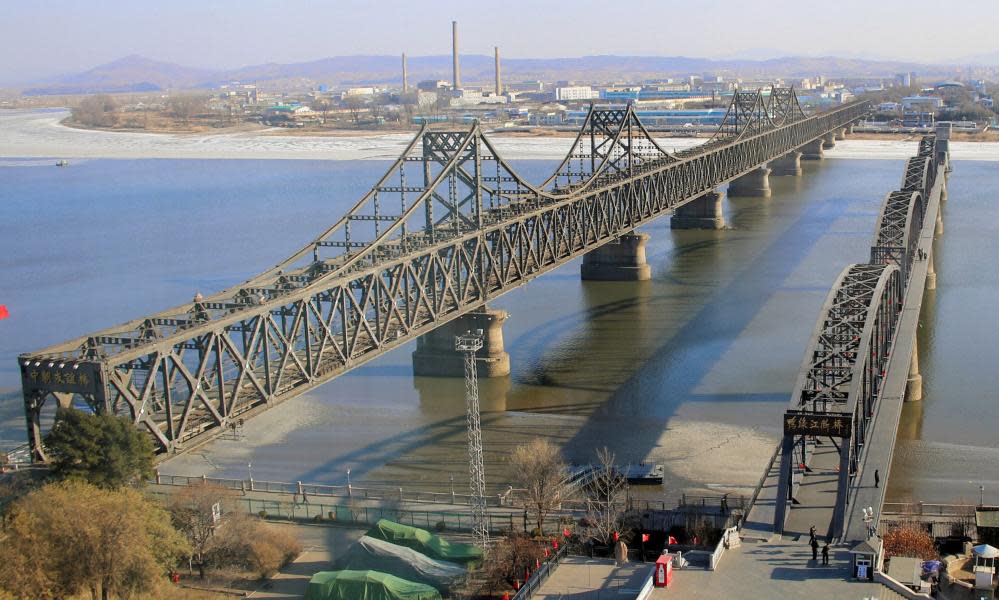China building network of refugee camps along border with North Korea

China is quietly building a network of refugee camps along its 880-mile (1,416km) border with North Korea as it braces for the human exodus that a conflict or the potentially messy collapse of Kim Jong-un’s regime might unleash.
The existence of plans for the camps, first reported in English by the Financial Times last week, emerged in an apparently leaked internal document from a state-run telecoms giant that appears to have been tasked with providing them with internet services.
Much of the regime’s domestic legitimacy rests on portraying the country as under constant threat from the US and its regional allies, South Korea and Japan.
To support the claim that it is in Washington’s crosshairs, North Korea cites the tens of thousands of US troops lined up along the southern side of the demilitarised zone – the heavily fortified border dividing the Korean peninsula. Faced with what it says are US provocations, North Korea says it has as much right as any other state to develop a nuclear deterrent.
North Korea’s leader Kim Jong-un is also aware of the fate of other dictators who lack nuclear weapons.
The China Mobile document, which has circulated on social media and overseas Chinese websites since last week, reveals plans for at least five refugee camps in Jilin province.
The document, which the Guardian could not independently verify, says: “Due to cross-border tensions … the [Communist] party committee and government of Changbai county has proposed setting up five refugee camps in the county.”
It gives the names and locations of three such facilities: Changbai riverside, Changbai Shibalidaogou and Changbai Jiguanlizi. The New York Times reported that centres for refugees were also planned in the cities of Tumen and Hunchun.
A spokesman for China’s foreign ministry declined to confirm the camps’ existence at a regular press briefing on Monday but did not deny they were being built. “I haven’t seen such reports,” Lu Kang told reporters.
The question was purged from the foreign ministry’s official transcript of the briefing, as regularly happens with topics raised by foreign journalists that are considered politically sensitive or inconvenient.
The leaked document contains the name and telephone number of a China Mobile employee who drafted it but calls to that number went unanswered on Tuesday. The construction of the camps appears to reflect growing concern in Beijing about the potential for political instability – or even regime collapse – in North Korea.
Cheng Xiaohe, a North Korea specialist from Renmin University in Beijing, said while he could not confirm whether the document was genuine, it would be irresponsible for China not to make such preparations.
“Tensions are high on the Korean peninsula … it is on the brink of war. As a major power and a neighbouring country, China should make plans for all eventualities.”
Jiro Ishimaru, a Japanese documentary maker who runs a network of citizen journalists inside North Korea and on the Chinese side of the border, said a contact in Changbai county had recently told him that while they had not seen signs of camps being built there, they “had heard there are plans to build a facility”.
Tensions on the Korean peninsula have soared this year as the US president, Donald Trump, has stepped up pressure on his North Korean counterpart and Pyongyang has accelerated its nuclear and ballistic missile programmes.
Trump has baited Kim with the nickname “Little Rocket Man” and threats of military action, while Kim has responded with insults of his own, and a succession of nuclear and missile tests that have brought two new rounds of UN sanctions.
Following its latest intercontinental ballistic missile test on 29 November, Pyongyang claimed the ability to strike anywhere on US soil.
In an interview with the Guardian in Beijing on Monday, Dennis Rodman, the NBA star turned would-be peacemaker, played down fears of a catastrophic nuclear conflict and denied Kim, whom he calls his friend, was “going to try and bomb or kill anyone in America”.
“We ain’t gonna die, man, come on, no … It’s not like that,” Rodman insisted, urging Trump to use him as an intermediary to engage with Kim. He described the verbal war between Trump and Kim as “a chess game” that should not be taken too seriously.
Beijing seems less certain. Last week one official newspaper in Jilin, the Chinese province closest to North Korea’s nuclear test site, hinted at that nervousness with a full-page article offering tips on how to react to a nuclear incident.
Iodine tablets, masks and soap were useful allies in the event of such a catastrophe, readers of the Jilin Daily learned.
Additional reporting by Wang Zhen and Justin McCurry in Tokyo.

 Yahoo News
Yahoo News 
